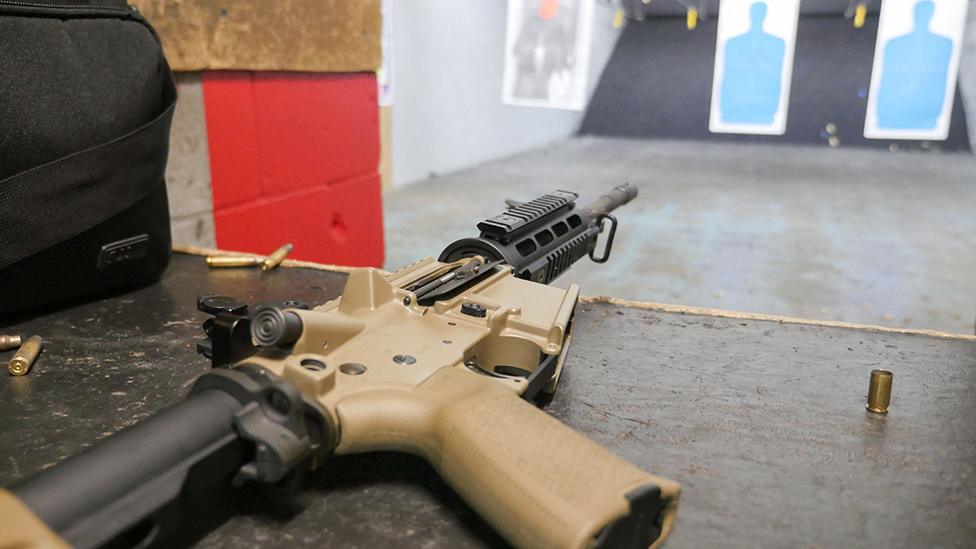Gun control: Biden issues executive order on background checks
- Published

US President Joe Biden has issued an executive order that aims to increase the number of background checks conducted before firearm sales.
It aims to move the US "as close to universal background checks as possible without additional legislation".
The Democratic president signed the measure Tuesday during a visit to Monterey Park, California, where a gunman killed 11 people in January.
Action on gun control appears unlikely in a divided Washington.
Last year, Mr Biden signed a cross-party gun violence reduction measure into law and he has repeatedly asked Congress to do more about what he calls an "epidemic".
But his call for an assault weapons ban, universal background checks on gun sales and repealing gun manufacturers' immunity from prosecution are unlikely to make headway while Republicans control the US House of Representatives.
Mr Biden's executive order - which does not require the approval of Congress - acknowledges this political reality and lays out a series of actions within his authority, beginning with the expansion of background checks.
"It's just common sense," said the president. "Check whether someone is a violent felon, a domestic abuser, before they buy a gun."
Universal background checks - or the requirement to run a gun buyer's information through an FBI database before a sale is made - are seen as key to closing legal loopholes that allow prohibited purchases and are supported by a broad majority of the American public. But legislation that requires criminal background checks for all guns sales has languished in the Senate with even some Democrats opposing it.
The executive order attempts to crack down on gun sellers who break the law.
Mr Biden will direct the US attorney general to clarify the statutory definition of who is "engaged in the business" of dealing in firearms, to devise a plan that prevents firearms dealers whose licenses were revoked from continuing to sell, and to name and shame firearms dealers who are breaking the law.
Kris Brown, president of the gun control non-profit Brady, wrote on Twitter: "While we still need urgent legislative action from Congress, [the president's] announcement today gets us closer to universal background checks than any other President that has come before."
The executive order also calls for a proposal on how the federal government can meet the short and long-term needs of a community impacted by mass shootings, similar to how authorities respond to natural disasters.
On Tuesday, Mr Biden spent time with the relatives of victims in the mass shooting in Monterey Park, in the Los Angeles suburbs, and memorialised each one during his remarks.
"We remember and mourn today, but I'm here with you today to act," he said.
His order calls on the Federal Trade Commission to issue a report on how gun manufacturers target civilians, especially minors.
It also aims to reduce the theft or loss of firearms during shipment between dealers, and mandate better reporting of ballistics data so law enforcement can match shell casings to the guns from which they were fired.
The president's directive includes a call for raising public awareness over safe firearm storage and over "red flag" laws, also known as extreme risk protection orders. Signed in 19 states and the District of Columbia, these laws allow individuals to petition a court to temporarily confiscate guns from people with potentially violent or harmful behaviour.
Last month, the Justice Department sent out more than $200m to help states administer their red flag laws.
Reaction to the executive order has been largely positive.
The Everytown gun control coalition wrote it "would improve community safety, hold the gun industry and rogue gun dealers in our communities accountable, and save lives", while the March For Our Lives student movement called it "a direct response to the demands young activists have been asking for".